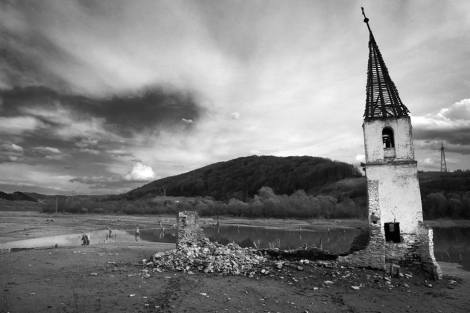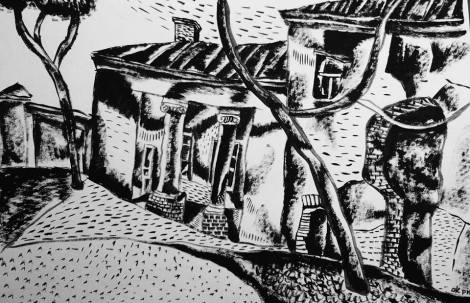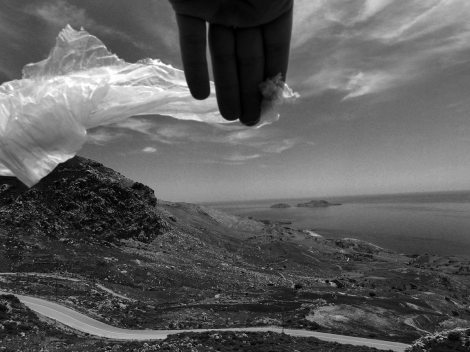Arta lui Oleg Tishkovets (n. 19 decembrie 1961, Kiev, Ucraina, Facultatea de Arhitectură din Kiev, restaurator de icoane, grafician, critic de artă, poet) degajă o tristețe balcanică, veche și perenă.
Fotografiile sunt impregnate de monotonia și decadența unei lumi înțepenite în timp și într-un proiect anistoric. Oleg nu vede neapărat peisajul, ci ”povestea” consumată și depășită, dincolo de peisaj. E o istorie amară, din care strălucirea și splendoarea umanului se retrag în fața unei naturi dureros de triste, în care Copacul a înlocuit Omul, la fel de singuri și unul și celălalt.
Orașul pictat/fotografiat de Oleg Tishkovets este o alcătuire de clădiri ruinate, lipsite de viață. Starea clădirilor, exterioară, denotă starea interioară a Omului, muzica unui suflet în umbră, de o indescriptibilă melancolie. Ici-colo, câte o statuie, și ea în ruină, amintește de ”zăpezile de altădată” și pare că se aud râsete și zgomot de roți de caleașcă pe caldarâm.
Omul, absent în fotografii și în picturi, este, paradoxal, principala temă, prin forța destructivă pe care o imprimă lumii lui, prin efectele nepăsării lui. Omul lipsit de noroc, omul care se complace în istoria personală, omul care lenevește, mulțumindu-se cu nimic, omul – credul mecanism al sistemului – omul obosit și ruinat de lipsuri, ruinat de iubire, ruinat de propriile-i temeri. Istoria din arta lui Oleg este cea a Omului în ruină.
În pictură se dezvăluie latura ludică a personalității artistului. Bun colorist, dar și adept al monocromiei, el alege, drept elemente ale creației, ceea ce vede cu ochii fotografului. Pictorul nu vede alte realități decât fotograful, iar această complementaritate dă lucrărilor un ton viguros și unitar.
Lumea lui Oleg este situată în acea veșnică ”zonă” tarkovskiană, straniu fantastică prin liniștea absolută pe care o degajă. O lume post-apocaliptică, absurdă și dureroasă, o lume atât de cunoscută nouă, celor ”din Est”, ca o rană ce nu se mai poate închide. Lumea artistului nu caută desăvârșirea pentru că știe că ea nu există. De aceea își duce povara fără să se mire, fără să întrebe, fixată într-o așteptare continuă. Drumul există în această lume, dar el nu duce nicăieri, sau, dacă duce, totuși, undeva, e spre natură, o natură în devălmășie, cotropită de liane și arbori care își întind spre niciunde crengile ca niște mâini fără putere.
Din lumea lui Oleg Tishkovets, Creatorul s-a retras de mult, surd si orb la gesturile creaturii. Este o lume la capătul abisului.
© Elena Agachi, 26.04.2015
At the End of the Abyss (Oleg Tishkovets)
The art of Oleg Tishkovets (born on 19 December 1961 in Kiev, Ukraine, a graduate from The University of Architecture, an icon restorer, graphic artist, art critic and poet) gives off a certain Balkanic sadness, old yet perennial.
Tishkovets’ photographs are imbued with the monotony and decadence of a world stuck in time and in a timeless project. The artist sees beyond the landscape, the “story” consumed and left behind. It is, in fact, a bitter history, from which the splendor and the greatness of human nature have withdrawn, giving way instead to painfully sad nature, where The Tree has replaced The Man, both equally lonely.
The city painted/photographed by the Ukrainian artist is a multitude of lifeless, ruined buildings. The outside of the buildings matches the inner state of Man, the music of a soul filled with shadows, with melancholy which eludes words. Here and there the odd statue, also in ruins, reminds the viewer of “ les neiges d’antan” and there seems to be laughter, and the noise of wheels on the pavement.
Although absent from paintings and photographs, Man is undoubtedly their main theme through the destructive force which affects his world and the effects of his carelessness: the man with no luck, the man who indulges in his own personal history, the man who is idle, settling for nothing, the man – a gullible cog in the system, the man who is exhausted and in need, ruined by love and by his own fears. The history in Oleg Tishkovets’ art is the history of the Man in shambles.
Tishkovets’ paintings reveal the playful side of his personality. Very good with colors but also an adept of black and white, he chooses what the photographer can see as elements of his creation. The painter and the photographer see the same reality, and this gives a vigorous unifying tone to the artist’s works.
Oleg Tishkovets’ world is situated in a still tarkovskian “zone”, strangely fantastic through the absolute silence, which it emanates. It is a post-apocalyptic world, absurd and aching, a world ever so familiar to us, easterners, like a wound forever open. The world of the artist no longer seeks perfection, for it knows perfection does not exist. That is why Tishkovets’ world carries its burden without any questions or questioning, fixed as it is in never-ending anticipation. The road does exist in this world, but it leads to nowhere, or, if/when it does, it leads to disorganized nature, overwhelmed by vines and trees spreading to nowhere their branches like powerless hands and arms.
From Oleg Tishkovets’world the Creator withdrew a long time ago, deaf and blind to the gestures of creation. It is a world at the end of the abyss.
In English by Ionela Iacob
Mulțumesc, Ionela!!
























fotografia lui Oleg are ceva cetos, indefinit si straniu, pictura e insa calda, fara a se lipsi de o stare ambigua…
Un text pe măsura imaginilor
Reblogged this on leneşrĂu's Blog ?.